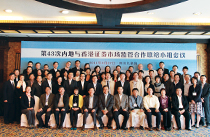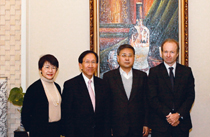Regulatory collaboration
As a regulator in a world-class financial centre, we interact, communicate and collaborate with local, overseas and Mainland counterparts on issues of common interest or matters that require co-operation among multiple regulators and authorities.
During the year, we continued to participate in a number of task forces and committees of international standard setting bodies to work on implementing financial regulatory reforms, enhancing standards and facilitating market development. Similarly, we collaborated with various Mainland authorities and contributed to developing Hong Kong as a centre for offshore renminbi activities and international asset management. Locally, we worked closely with relevant regulatory authorities on regulatory issues that required joint efforts.
Towards resolving global regulatory issues
IOSCO
We continued to contribute to the work of IOSCO through active participation in its seven standing committees and all of its key task forces. Below are the highlights of our participation during the year:
- Our Senior Director of Intermediaries Supervision continued to chair the Standing Committee on the Regulation of Market Intermediaries. During the year, the committee published a consultation paper that set out suitability obligations applicable to intermediaries in the distribution of complex financial products. In addition, the committee is conducting a high-level comparison of two key capital frameworks for securities firms.
- As part of the ETF sub-group of the Standing Committee on Investment Management, we contributed to the consultation paper on principles for the regulation of ETFs.
- Under the Standing Committee on Investment Management, our active participation helped complete the principles for suspension of redemptions of collective investment schemes (CISs). We also offered input to the consultation report on principles for valuation and liquidity risk management of CISs, and studied money market fund systemic risk analysis and reform options.
- We commented and provided input to a number of reports released by the Task Force on OTC Derivatives Regulation, the Task Force on Commodity Futures Market, and the Standing Committee on Secondary Markets. These reports covered topics such as data reporting and aggregation of OTC derivatives transactions, mandatory clearing requirements for OTC derivatives, principles for regulation of commodity derivatives markets, and regulatory issues arising from technological changes.
- We also have been providing input to an annual publication to be issued by the Standing Committee on Risk and Research on assessment of key systemic risks impacting the securities markets.
Through our representation in the Implementation Task Force, we contributed significantly to the revision of IOSCO principles and methodology. IOSCO members are expected to adhere to the principles and apply the methodology to their respective legal and regulatory frameworks.
FSB
As a member of the Financial Stability Board’s (FSB) Standing Committee on Standards Implementation (SCSI), we actively participate in its work. During the year, we:
- continued to support the SCSI’s peer review programme and participated in the thematic review on compensation practices of major financial institutions and helped finalise the review reports on compensation practices and peer experience. In the peer review report, Hong Kong was recognised as a jurisdiction that had implemented in full the FSB’s Principles for Sound Compensation Practices and their Implementation Standards;
- further supported the SCSI’s Coordination Framework for Implementation Monitoring (CFIM), essentially a foundation for the FSB to collaborate with other standard-setting bodies to monitor and report on the implementation of the G-20’s financial reform initiatives, including OTC derivatives market reforms, compensation practices, policy measures for the global systematically important financial institutions and shadow banking; and
- actively contributed to work regarding the Implementation Monitoring Network of the SCSI, which collects information on the progress of national authorities in implementing the G-20’s and FSB’s recommendations on financial reforms, identifies national differences in implementation and considers the needs to address them. (The national progress reports are posted on the FSB Web site.)
Other international regulatory forums
In the Market Structure Roundtable organised by the US Securities and Exchange Commission and the UK Financial Services Authority, we led the discussion on high-frequency trading, along with other topical issues discussed such as market fragmentation and undisplayed liquidity. Further meetings were held to exchange views on the regulatory reforms of OTC derivatives.
Our Deputy Chief Executive Officer and Executive Director of the Policy, China and Investment Products Division was appointed to co-chair a newly-created working group focusing on achieving the G-20’s objective of mitigating systemic risk in the derivatives markets and increasing standardisation and central clearing of derivatives. The working group will develop a proposal to seek public comments regarding margin requirements for uncleared OTC derivatives. The working group is a collaborative initiative of the Basel Committee on Banking Supervision, IOSCO, the Committee on Payment and Settlement Systems (CPSS) and the Committee on the Global Financial System.
We continued to exchange views and share information with members of the OTC Derivatives Regulators’ Forum on trade repositories (TRs) and OTC derivatives central counterparties (CCPs). The forum is developing co-operative oversight arrangements among authorities involving TRs and OTC derivatives CCPs with wide international memberships and working with the industry to provide reactions, perspectives and guidance that authorities may have with respect to any regulatory issues facing global TRs that are in operation or being established. Also, as a member of the Steering Committee of the CPSS-IOSCO Working Group, we contributed to the consultative report on new principles for financial market infrastructures.
In March 2012, we entered into a memorandum of understanding with the European Securities and Markets Authority (ESMA) regarding the supervision and exchange of information concerning CRAs. In the same month, ESMA announced that it considered the regulation of CRAs in Hong Kong to be in line with their regulation in the European Union. This decision by ESMA allows European financial institutions to continue using, for regulatory purposes, credit ratings that have been prepared in Hong Kong. European CRAs will also be in a position to endorse credit ratings issued by CRAs licensed in Hong Kong.

The 43rd MORC Meeting held in Sichuan

Visit to CSRC Chairman Guo Shuqing
Strengthening cross-border collaboration
As Mainland and Hong Kong capital markets become more intertwined and offshore renminbi businesses in Hong Kong continue to grow, most of the policy initiatives that we have been pursuing require support from multiple Mainland authorities and stakeholders. To deepen economic and financial co-operation between the Mainland and Hong Kong, we continued to strengthen our relationships with, and enlist support from, various Mainland authorities. During the year, we:
- held high-level discussions with a number of Mainland authorities to exchange views and garner their support for initiatives such as the RQFII scheme, renminbi foreign direct investment, renminbi bonds, and the Mainland and Hong Kong Closer Economic Partnership Arrangement;
- organised training and briefing sessions for Mainland officials and executives to further their understanding of the Hong Kong market, our regulatory regime, and the potential benefits and importance of closer financial co-operation across the border;
- provided support to the Government and gave analytical input to a number of initiatives between Hong Kong and Mainland regions and cities; our executives also spoke at various meetings and symposiums on Hong Kong’s financial co-operation with Guangdong, Shanghai and Beijing; and
- exchanged views with the China Securities Regulatory Commission, China Securities Depository and Clearing Corporations as well as stock exchanges of both markets on issues relating to cross-border regulatory co-operation and development of cross-border investment products.
The above efforts also have been complementing our participation in developing Hong Kong into an international asset management centre and an offshore renminbi centre, as set out in the Mainland’s Five-year Plan released in March 2011.
Working closely with local regulators
During the year, we collaborated with the HKMA, the Mandatory Provident Fund Schemes Authority (MPFA) and the Insurance Authority (IA) and some other local regulators on a number of regulatory issues.
- We worked closely with the HKMA in the process by which five banks transferred their sponsor business to SFC-licensed corporations.
- Jointly with the HKMA, the IA and the Customs and Excise Department, we developed generic guidelines to meet the requirements of the newly enacted Anti-Money Laundering and Counter-Terrorist Financing (Financial Institutions) Ordinance, which are applicable to all specified financial institutions.
- We also have been working closely with the HKMA to develop a regulatory regime for the OTC derivatives market in Hong Kong (see Market infrastructure & trading).
- Regarding the Government’s proposals to create a new regulatory regime for MPF intermediaries, we worked with the MPFA to draft co-operative arrangements between the two regulators and held high-level meetings to discuss topical issues, such as employee choice arrangement.
- We also discussed with the IA issues concerning investment-linked assurance schemes and the development of KFSs.

